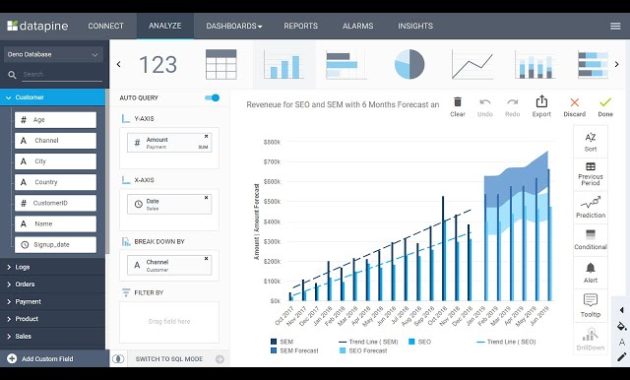
Unlock Business Intelligence Software for Accuracy Easily: A Guide to Data-Driven Decisions
In today’s fast-paced business environment, the ability to make informed decisions is paramount. Companies that can effectively analyze data and extract actionable insights are the ones that thrive. This is where business intelligence (BI) software comes into play. This guide will explain how to unlock business intelligence software for accuracy easily, transforming raw data into powerful strategies.
The core of business intelligence revolves around collecting, processing, and analyzing data. The goal is to transform this data into meaningful information. This information then helps businesses make strategic decisions. It also enhances operational efficiency and improves overall performance. This is achieved through various BI tools and techniques. These include data warehousing, data mining, and reporting.
The benefits of using BI software are numerous. It allows businesses to:
- Gain a deeper understanding of their customers.
- Identify market trends.
- Optimize operational processes.
- Improve profitability.
By learning how to unlock business intelligence software for accuracy easily, businesses can position themselves for significant growth and success. The power of data is undeniable. BI software helps harness this power effectively.
Understanding Business Intelligence Software
Business intelligence software encompasses a range of tools and applications. These are designed to collect, process, analyze, and present business data. The goal is to provide users with actionable insights. This helps them make better decisions.
Key components of BI software include:
- Data Warehousing: Storing large volumes of data from various sources.
- Data Mining: Discovering patterns and trends within data.
- Reporting and Analytics: Presenting data in a clear and concise manner through dashboards and reports.
- Data Visualization: Using charts and graphs to make data easier to understand.
These components work together to transform raw data into valuable insights. This enables businesses to make data-driven decisions. The right BI software can significantly improve business performance. Businesses can optimize operations and boost profitability.
Choosing the Right Business Intelligence Software
Selecting the right BI software is crucial for success. The options available are vast. They vary in features, complexity, and cost. Before making a decision, consider these factors:
- Business Needs: Identify your specific business goals and data analysis requirements.
- Data Sources: Determine the sources from which you will collect data.
- Scalability: Choose software that can accommodate future growth.
- User-Friendliness: Opt for software that is easy to use and understand.
- Integration Capabilities: Ensure the software integrates with existing systems.
- Cost: Consider the total cost of ownership, including software, implementation, and training.
Researching different software options is essential. Compare features, pricing, and user reviews. Consider free trials or demos to evaluate software performance. This will help you find the best fit for your business.
Implementing Business Intelligence Software
Implementing BI software involves several steps. Proper planning and execution are vital for a successful implementation.
- Define Objectives: Clearly define the goals you want to achieve with the software.
- Data Integration: Integrate data from all relevant sources. This includes databases, spreadsheets, and cloud services.
- Data Preparation: Clean and transform data to ensure accuracy and consistency.
- Software Configuration: Configure the software to meet your specific needs.
- User Training: Train employees on how to use the software effectively.
- Testing and Validation: Test the software to ensure it functions correctly.
- Deployment: Deploy the software and begin using it to analyze data.
Successful implementation often involves a phased approach. Start with a pilot project to test the software. Then expand its use across the organization. This approach reduces risks and ensures a smooth transition. Proper training is essential for user adoption. Ensure users understand the software’s features and capabilities.
Maximizing Accuracy with Business Intelligence Software
Accuracy is a key component of effective business intelligence. Inaccurate data can lead to poor decisions. These decisions can negatively impact business performance. To maximize accuracy, consider these best practices:
- Data Quality: Implement data quality checks. These include validation rules and data cleansing processes.
- Data Governance: Establish data governance policies and procedures. This ensures data integrity and consistency.
- Data Validation: Regularly validate data against external sources. This confirms its accuracy.
- Data Security: Protect data from unauthorized access or manipulation.
- Regular Audits: Conduct regular audits of your data and BI systems. This ensures data accuracy and system performance.
By focusing on data quality and accuracy, businesses can trust the insights generated. They can make more informed and effective decisions. This will lead to improved business outcomes.
Advanced Techniques to Unlock Business Intelligence Software
To truly unlock business intelligence software for accuracy easily, explore advanced techniques. These techniques can enhance your data analysis capabilities.
- Data Mining: Use data mining techniques to discover hidden patterns and trends.
- Predictive Analytics: Use predictive analytics to forecast future trends and outcomes.
- Machine Learning: Leverage machine learning algorithms to automate data analysis tasks.
- Big Data Analytics: Utilize big data analytics tools to analyze large and complex datasets.
- Real-Time Analytics: Implement real-time analytics to gain insights as data is generated.
These advanced techniques can help you gain a competitive edge. They can also enable you to make more proactive and strategic decisions. Stay updated with the latest advancements in BI. Continuously improve your skills and knowledge.
Real-World Examples of Business Intelligence Software in Action
Many businesses use BI software to improve their operations. Here are some real-world examples:
- Retail: Retailers use BI software to analyze sales data. They identify popular products and optimize inventory. This helps to reduce costs and increase revenue.
- Healthcare: Healthcare providers use BI software to analyze patient data. They can identify trends and improve patient care. They can also optimize resource allocation.
- Finance: Financial institutions use BI software to analyze financial data. They can detect fraud and manage risk. They can also improve customer service.
- Manufacturing: Manufacturers use BI software to analyze production data. They can optimize processes and reduce waste. They can also improve product quality.
These examples demonstrate the versatility and value of BI software. They show how different industries can benefit from data-driven insights. By learning from these examples, you can unlock business intelligence software for accuracy easily.
The Future of Business Intelligence Software
The future of BI software is bright. It is constantly evolving with new technologies and capabilities. Trends to watch include:
- Artificial Intelligence (AI): AI will continue to play a major role in BI. It automates data analysis and delivers more insights.
- Cloud Computing: Cloud-based BI solutions will become more prevalent. They offer greater flexibility and scalability.
- Data Visualization: Data visualization tools will become more advanced. They will make data easier to understand.
- Mobile BI: Mobile BI solutions will become more important. They enable users to access insights on the go.
- Self-Service BI: Self-service BI tools will empower business users. They can analyze data and generate reports without IT support.
Staying informed about these trends is essential. It helps to ensure you are using the most effective BI tools and strategies. This will allow you to unlock business intelligence software for accuracy easily. This will also help you stay ahead of the competition.
Conclusion: Embracing Data-Driven Decision Making
Business intelligence software is a powerful tool. It can transform raw data into actionable insights. It empowers businesses to make better decisions. It improves operational efficiency. This guide has provided a comprehensive overview of BI software. It covered its benefits, implementation, and best practices.
By learning how to unlock business intelligence software for accuracy easily, you can gain a competitive edge. You can drive growth and success. Embrace the power of data. Invest in the right BI tools and strategies. You can position your business for long-term success. The future of business is data-driven. The ability to analyze and use data effectively is essential for survival and growth. [See also: Benefits of Business Intelligence Software]

